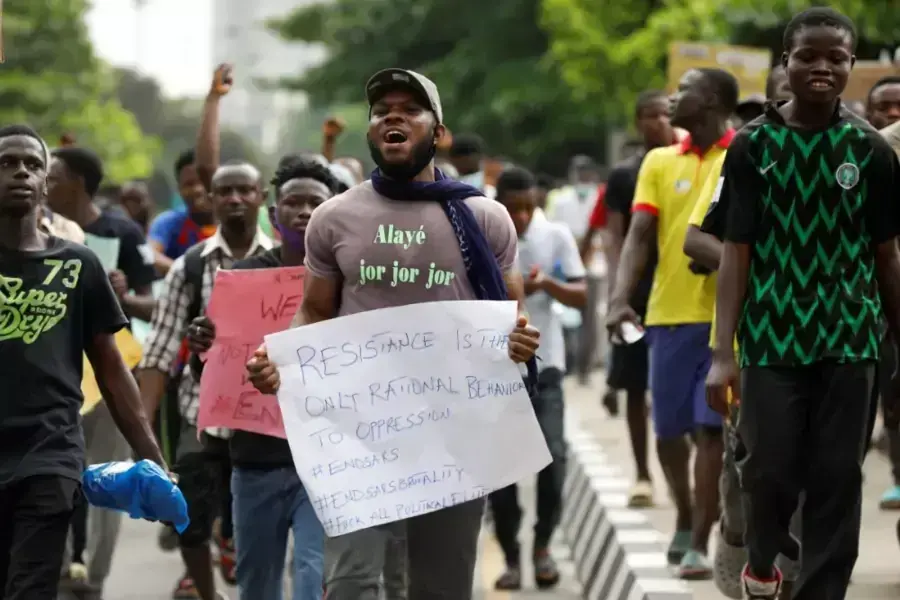State Department Report Highlights Magnitude of Human Rights Challenge in Nigeria

The just released Nigeria 2021 Human Rights Report confirms what observers and rights advocates already know about the Nigerian state’s execrable human rights record and the increasingly dismal daily experience of Nigerians.
Released annually since 1977 by the United States Department of State, the Country Reports on Human Rights Practices are a critical gauge of the human rights situation across the world.
More on:
In arguably its most pointed summation, the Nigeria report references repeated and persistent human rights abuses in the country, including “unlawful and arbitrary killings by both government and nonstate actors; forced disappearances by the government, terrorists, and criminal groups; torture and cases of cruel, inhuman, or degrading treatment or punishment by the government and terrorist groups; harsh and life-threatening prison conditions;” and “arbitrary arrest or detention.”
The report also mentions “serious problems with the independence of the judiciary; arbitrary or unlawful interference with privacy; serious abuses in a conflict, including killings, abductions, and torture of civilians; serious restrictions on free expression and media, including violence or threats against journalists and the existence of criminal libel laws; serious restrictions on internet freedom; substantial interference with the freedom of peaceful assembly and freedom of association;” and “serious government corruption…”
Eerily similar in tone and gravity to previous annual reports, the 2021 report highlights the seriousness of the Nigerian situation, captured by the citizens’ and observers’ persistent concern about heightened impunity and the continued disjuncture between democratic transition and democratic norms.
Among other factors, analysts have attributed Nigeria’s poor human rights record since the inauguration of the Fourth Republic in 1999 to a hangover from the military era, noting that two of the four post-military regimes have been headed by former military heads of state—Olusegun Obasanjo (1999-2007) and the incumbent, Muhammadu Buhari (2015-Present). While this is plausible, data from previous years confirm that routine abuse is not a preserve of any administration.
Nor, importantly, is it exclusive to the state, maltreatment and casual violence being integral to the quotidian operations of civil society in the country. Instructively, the latest report alludes to “gender-based violence, including but not limited to domestic and intimate partner violence, sexual violence, child violence, early and forced marriage, female genital mutilation/cutting, and other harmful practices; crimes of violence targeting members of national/racial/ethnic minority groups;” none of this necessarily requires the involvement of the state.
More on:
That said, the current administration has not shied away from throwing the book at its perceived enemies. For instance, law enforcement agents have repeatedly targeted campaigners for ethnic determination like Sunday Adeyemo (alias Sunday Igboho), Nnamdi Kanu, and human rights activist Omoyele Sowore. The brutal putdown of the October 2020 #EndSARS protests against police impunity continues to resonate.
Enabled by the mood within the government, some top officials of the Buhari administration have shown flashes of arbitrariness. In 2020, broadcaster Rotimi Jolayemi was arrested and detained by the police for forty-five days for releasing a song on social media that was deemed “insulting” to the Minister of Information and Culture Lai Mohammed.
Another worrying trend highlighted in the latest report is the spate of arrests and convictions for blasphemy in the majority-Muslim northern part of the country. The most high-profile case is that of the president of the Nigerian Humanist Association Mubarak Bala, who was sentenced to twenty-four years in prison last week by a Kano State High Court after an unexpected guilty plea. The United States Commission on International Religious Freedom (USCIRF) has denounced the conviction as a clear violation of Bala’s “right to freedom of belief as defined under international law.” Prosecutors pressed ahead with Bala’s trial despite a December 2020 Abuja High Court ruling declaring his detention illegal and awarding him damages.
While Nigeria can point to some political progress since the return to civil rule in 1999, systematic human rights violations remain a nagging problem. The next administration will need to show a moral seriousness that seems to have eluded the present one.
In addition to providing material and moral support for human rights advocates in the country, the United States and other Western countries must not hesitate to defend the cornerstone principle that human rights are a universal value, applicable to individuals no matter their cultural pedigree, or the place and circumstances of their birth.
In the meantime, the United States should help pressure the Nigerian government to release Mubarak Bala. He is a prisoner of conscience and a shimmering example of “the indomitable will to live freely” alluded to in the preface to the 2021 report.
This publication is part of the Diamonstein-Spielvogel Project on the Future of Democracy
 Online Store
Online Store
